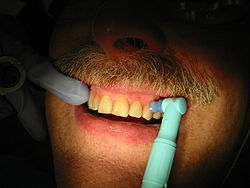Professional teeth cleaning[edit]
Teeth cleaning (also known as prophylaxis, literally a preventive treatment of a disease) is a procedure for the removal of tartar (mineralized plaque) that may develop even with careful brushing and flossing, especially in areas that are difficult to reach in routine toothbrushing. It is often done by a dental hygienist. Professional cleaning includes tooth scaling and tooth polishing and debridement if too much tartar has accumulated. This involves the use of various instruments or devices to loosen and remove deposits from the teeth.
As to the frequency of cleaning, research on this matter is inconclusive. That is, it has neither been shown that more frequent cleaning leads to better outcomes nor that it does not. A review of the research literature on the question concluded "[t]he research evidence is not of sufficient quality to reach any conclusions regarding the beneficial and adverse effects of routine scaling and polishing for periodontal health and regarding the effects of providing this intervention at different time intervals"[6] This conclusion was reaffirmed when the 2005 review was updated in 2007.[7][needs update] Thus, any general recommendation for a frequency of routine cleaning (e.g. every six months, every year) has no empirical basis.[8] Moreover, as economists have pointed out, private dentists (or other dental professionals) have an economic incentive to recommend frequent cleaning, because it increases their revenues.
Most dental hygienists recommend having the teeth professionally cleaned every six months.[citation needed] More frequent cleaning and examination may be necessary during treatment of dental and other oral disorders. Routine examination of the teeth is recommended at least every year. This may include yearly, select dental X-rays. See also dental plaque identification procedure and removal.
Good oral hygiene helps to prevent cavities, tartar build-up, and gum disease.
